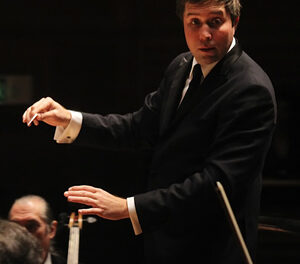Sometimes, just when you think you know an orchestra and are at risk of developing a “been there, done that” attitude, you experience a different and exciting concert. The North Carolina Symphony (NCS) has spent its first full year with new Music Director Grant Llewellyn touting itself as “America’s next great orchestra.” Despite that ambitious goal, the NCS has not forgotten how to have fun, take some chances on innovative programming, and swing. For “Summerfest,” the NCS moves to its summer digs at the Koka Booth Amphitheatre at Regency Park in Cary, relaxes a bit from the profundity and seriousness of the regular season subscription series, and plays with some wonderful guests. The evening of June 25 was a perfect night for an outdoor concert. Even arriving almost an hour before the baton came down, it was quite difficult to find a spot for my lounger on the lawn. I finally eased down with my PB&J sandwich and can of coke amid spreads of gourmet meals and expensive wine.
Leading the band on this occasion was Assistant Conductor Kenneth Raskin who is winding down his tenure with the NCS. Raskin had the opportunity to direct the wonderfully eclectic guest artists “Pink Martini” and to preside over a first half containing some very meaty orchestral works. He proved equally capable of leading a disciplined “classical” orchestra and dealing with all the twists and turns of the second half.
The evening kicked off with a selection that, no matter how many times you hear it, only strengthens and confirms the universal acceptance of Leonard Bernstein’s West Side Story as, quite possibly, “the” American masterpiece. The Overture doesn’t quite hit all the themes of the complete musical, but there is enough to cause someone who may be too young or who has been living in a cave for the past 50 years to wonder where such exquisite music came from. The NCS sustained the rhythmic drive like a tightly-knit jazz trio and delivered a beautifully evocative performance as the sun went down in Cary.
Another overture by another American composer was up next. The Overture to “The School for Scandal” is a great example of Samuel Barber’s unique compositional style. All his works are meticulously crafted, and this Overture is a mixture of virtuosic flourishes and sublime melodic passages. There were some moments when you could sense a somewhat more relaxed response from the orchestra than would normally occur during the season at Meymandi, but by this time, as I looked around, wine was flowing like water, so I doubt that anyone noticed – or cared about – such fine points.
The first half closed with a thrilling rendition of selections from Manuel de Falla’s ballet The Three-Cornered Hat, preceded by Raskin’s very illuminating explanation of the story behind the music. This is perhaps the epitome of a musical depiction of the Spanish soul and musical culture. In addition to its own brilliant display, this music also served as a fitting prelude to what was to come after intermission.
It’s a safe bet that most people present on this evening had no real idea what or who “Pink Martini” is, but, the name is certainly cool, they sound like they are different but not too threatening, and there are probably no other 12-person, conservatory-trained bands from Portland, Oregon. The easiest way to describe them is to simply use what their website and most of their promos say: “Somewhere between a 1930s Cuban dance orchestra, a classical chamber music ensemble, a Brasilian (sic) marching street band and Japanese film noir is the 12-piece Pink Martini.” Well, that sure isn’t your typical ensemble!
They came out and immediately started a flourish of sounds featuring their four percussionists but then switched to cellist Pansy Chang as she launched into the familiar broken-record theme of Ravel’s “Bolero.” Thankfully, her version was a bit shorter than the original. Based on this, you would never have expected what was to come later on, but first came the appearance of singer China Forbes. There may have been eleven other players and 65 in the orchestra, but she quickly became the focal point. A combination of a big-band singer from the 1940s, a sultry Latin singer, a French chanteuse, and more, Forbes was at home and believable in a myriad of styles and languages. Thomas Lauderdale, the group’s founder, pianist, and artistic director also fronted the whole operation. The other main featured performer was Gavin Bondy on trumpet. He had a solo in nearly every selection and was also spotlighted in a quasi-concerto made famous by Harry James.
The selections ranged from a sinister and spooky version of the 1950s Doris Day hit “Que Sera, Sera” to a song in Croatian and then on to a French cabaret-style number, but considering their four percussionists, “Pink Martini” really shines when performing Latin-style works. It is how I imagine a really hot group from Cuba playing the Copacabana in New York in the 1950s would have sounded – hot, pulsating rhythms, high, bright and clear trumpets, and a beautiful, sultry woman fronting the band.
For the most part, the orchestral background consisted of sustained chords and occasional section solos. Although “Pink Martini” regularly plays with orchestras on their tours, I would have preferred to have heard them all by their lonesome – if you can call a dozen players being alone. It was nice to have the added bonus of two TV screens unobtrusively hanging from the top of the two light poles. They mostly focused on China Forbes – the camera persons were all men!
Summerfest continues through July 23; click here for details.











